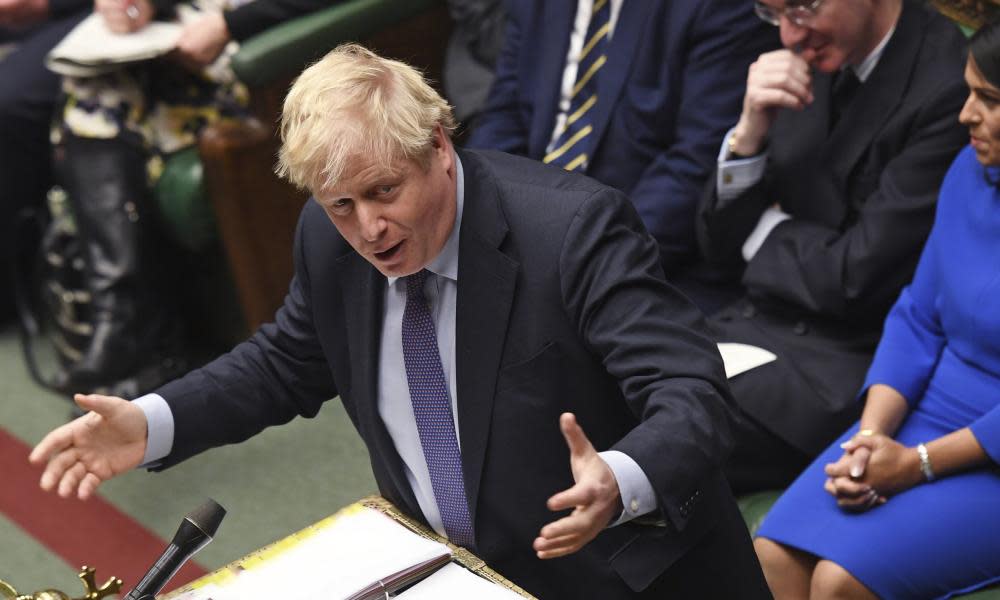Boris Johnson is using the Covid crisis as a pretext for a power grab

The coronavirus pandemic is proving to be a cover for Boris Johnson’s government to seize powers that are without precedent during peacetime. I am becoming more convinced over time that some in his government and advisers saw the virus early on not only as a health crisis, but also an opportunity to push ahead with their plans to diminish parliament’s sovereignty, row back on the rule of law, and hollow out our hard-won rights. Ultimately, the aim is to solidify more power in the hands of the prime minister and a select few of his inner circle.
Their direction of travel was obvious before the pandemic hit – a year ago Johnson tried to shut down parliament – but under cover of Covid-19, it is now bold and blatant. As one of only three countries with an unwritten constitution - New Zealand and Israel being the others – the UK has always been vulnerable to a group of unscrupulous individuals coming into power who would not fear stretching the rules, protocols and parliamentary instruments to their limits, and seek to establish an authoritarian state.
They have now arrived, and with Jacob Rees-Mogg, the leader of the house, dusting off ancient Henry VIII powers, statutory instruments, as well as carving out new powers contained in the EU Withdrawal Act and Coronavirus Act, he is systematically going about the task of disenfranchising our elected MPs.
Related: Boris Johnson confronts backbench critics over Covid restrictions
Events have always been a problem for prime ministers - as Harold Macmillan attested - but they have played into Johnson and his advisers’ hands. Public unease about his response to the coronavirus is now palpable - instead of showing strong leadership and competence, he still appears to be in campaigning mode, more concerned about being seen to take action regardless of the merits. And with MPs muzzled, his coterie are able to bypass requests to publish data, modelling and the scientific evidence behind their pandemic strategies – or any studies into the impact of a no-deal Brexit.
Some MPs are finally beginning to recognise that in this new political world they are surplus to requirements, and as a result we have seen a few attempts at rebellion over the past few weeks.
There had been anxieties for years about the use and limited scrutiny of secondary legislation (laws created by ministers without parliamentary votes), but this is now the government’s modus operandi. Since 28 January, 256 of these statutory instruments related to coronavirus have been laid before parliament, an astonishing 122 of which breach the 21-day rule giving MPs time to scrutinise them.
Foreign secretary Dominic Raab told the virtual Conservative party conference at the weekend that Brexit is about taking back control of our laws and our sovereignty. Whether the UK gets a deal or not (I believe a deal will be achieved due to fears over further damaging a coronavirus-impacted economy), the transition period ends on 31 December – which means that, between now and then, the government could lay another 250-300 statutory instruments, without parliament having to pass any act. What they could sneak into these terrifies me because, however politically sensitive and controversial they are, MPs will be unable to debate, scrutinise and vote on them.
I knew only too well, long before the pandemic, the lengths our government would go to put itself above our domestic law. But to trash Britain’s international reputation for law and order - by inserting sections into the internal market bill that attempt to put the country above international law, and outside the scrutiny of parliament or UK courts - has ramifications that should worry us all, no matter what our political allegiance.
Raab also said that “the days of being held over a barrel by Brussels … are long gone”, but, with MPs voting to extend ministers’ executive powers for another six months under the Coronavirus Act, what about the barrel our own government is now holding us over?
In the years that followed the 2016 vote to leave the European Union, I was often invited to look ahead to what life would be like when the UK had to go it alone; but never, in my worst nightmares, could I have imagined the dystopian state of affairs we find ourselves in now.
Lindsay Hoyle, the Commons speaker, issued an unprecedented rebuke to the government for treating the House of Commons with “contempt”. I only wish he had gone further and asked Rees-Mogg why MPs are being denied the opportunity to participate in debates, and why online speeches are banned. Added to that, a freedom of information request I submitted confirms that a successful voting app, which was used in early May, has been sneakily discontinued - so we now have a dysfunctional, disfranchised House of Commons.
I also have my suspicions about the true motives underlying the government’s review into the appointment of judges and access to judicial review. On Twitter, Geoffrey Cox, the former attorney general who acted for Boris Johnson in my court case against his prorogation of parliament, posted a scene from the film A Man For All Seasons which tells of Thomas More’s stand during another period of tyranny in British history. More was urged to bend the law to his own ends but declined.
In the clip More uttered these words: “This country’s planted thick with laws from coast to coast and if you cut them down do you think you could really stand upright in the winds that would blow then?” Cox and I have little in common, but we can both see only too well that the direction we are heading is a profoundly dangerous one.
• Gina Miller is a businesswoman and transparency activist who led the legal action that prevented Boris Johnson proroguing parliament


